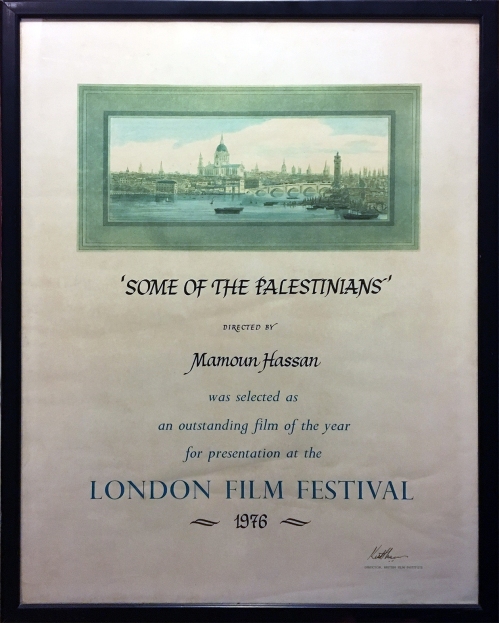We have digitally restored the original ‘Some of the Palestinians’ – a 55-minute documentary directed and edited by Mamoun Hassan when he was stationed with the United Nations Relief and Works Agency for Palestine Refugees (UNRWA) in Lebanon in 1974.
The film opens with a day in the life of Dr Murad, a Palestinian doctor appointed by the UNRWA to look after the health of the Palestinian people in a Syrian refugee camp. It progresses to a recently bombed camp in Lebanon to the West Bank, via Jordan.
The crew members and in Lebanon, the cinematographer, were Palestinians working in UNRWA’s Audio Visual Division, the rest of the film was shot by Ernie Vincze, the distinguished British documentary and feature cinematographer.
The final section presents a somewhat more acceptable picture of Palestinian life supported by UNRWA-sponsored humanitarian projects in women’s education and art in Ramallah. This last section was not directed by Mamoun, he explains why…
I landed in Beirut with my wife and young family on 19 April 1974 to take up my appointment as Head of Films Branch, UNRWA (United Nations Relief and Works Agency for Palestine Refugees). A leftist leader had been assassinated in South Lebanon the previous day and that event is regarded as the start of the civil war. A few days later I drove down to Nabatieh Palestinian refugee camp in South Lebanon to film the consequence of Israeli bombing. The camp had been obliterated. A few days later I filmed the effect of bombing in Rashidieh, a camp further down the coast near Tyre.
The brief was to document the services – Housing, Education, Health, Rations – that UNRWA offered the Palestinian refugees. My immediate boss and chief of the AV division was the legendary Myrtle Winter-Chaumeny (writer, photographer, sailor, dancer); the director of Information was John Defrates, the bravest man I have ever met, who was a Navy pilot in the icy waters near Vladivostock during WWll. I was given a fairly free hand but editorial control rested with UNRWA. What I saw in South Lebanon and elsewhere gave me the form of the film: the experience of life in the camps in Lebanon, Syria and Jordan – but not the West Bank because Israel refused me entry. Myrtle filmed that sequence.
So the story is about war in Lebanon; life in one the oldest camps near Aleppo established in 1948; work in Baqa’a in Jordan which accommodated thousands of fleeing refugees after the 1967 war; and education in Ramallah.
Mamoun is keen for people to view this film. It is a timely reminder that UNRWA’s humanitarian work is not done, despite the decision of the US administration to cut $300 m from its planned annual contribution to the UNRWA budget in 2018.
He says,
“Since I made this film, everything has changed for the worse for the Palestinian people. The locations for the film are now war zones or something very similar. The tragedy continues.”
The restoration was made from an answer print of the edited film. This version did not have English subtitles for spoken Arabic. By referring to the only other known copy – a print held at the National Film Archive – we were able to transfer the subtitles exactly as they appeared on the film, which was invited to the London Film Festival in 1976.


 Mamoun is pleased to have been invited to join the panel talking about the Film and Theatre Director, Film writer and influential film critic, Lindsay Anderson.
Mamoun is pleased to have been invited to join the panel talking about the Film and Theatre Director, Film writer and influential film critic, Lindsay Anderson.



